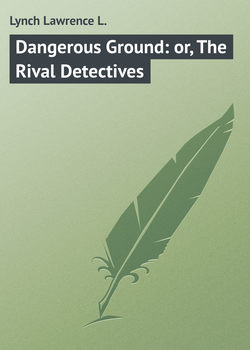Читать книгу Dangerous Ground: or, The Rival Detectives - Lynch Lawrence L. - Страница 3
PROLOGUE
II
ОглавлениеA flickering, sputtering candle, lights up the interior of a large canvas-covered wagon. On a narrow pallet across one side of the vehicle, a man tosses and groans, now and then turning his haggard face, and staring, blood-shot eyes, upon a woman who crouches near him, holding upon her knees a child of two summers, who slumbers peacefully through the storm, with its fair baby face upturned to the flickering candle. In the corner, opposite the woman, lies a boy of perhaps ten years, ragged, unkempt, and fast asleep.
A blaze of lightning and a rush of wind cause the man to cry out nervously, and then to exclaim, peevishly:
“Oh, I wish the morning would come; this is horrible!”
“Hush, Krutzer,” says the woman, in a low, hissing whisper; “you act like a fool.”
She bends forward and lays the sleeping child beside the dirty boy in the corner. Then she lifts her head and listens.
“Hush!” she whispers again; “they are astir outside; I hear them talking. Ah! some one is coming.”
“Mrs. Krutzer.”
It is the voice of Walter Parks, and this time the woman parts the tent flap and looks out.
“Is that you, Mr. Parks? I thought I heard voices out there. Is the storm doing any damage?”
“Not at present. Is Krutzer awake?”
She glances toward the form upon the pallet; it is shivering as with an ague. Then she says, unhesitatingly:
“Krutzer has been in such misery since this storm came up, that I’ve just given him morphine. He ain’t exactly asleep, but he’s stupid and flighty; get into the wagon, Mr. Parks, and see how he is for yourself. Poor man; this is the fifth day of his rheumatism, and he has not stood on his feet once in that time.”
The visitor hesitates for a moment, then drawing nearer and lowering his tone somewhat, he says:
“If Krutzer is in a bad state now, he had better not know what I have come to tell. Can he hear me as I speak?”
“No; not if you don’t raise your voice.”
“Pearson is dead, Mrs. Krutzer.”
She starts, gasps, and then, with her head protruding from the canvas, asks, huskily:
“How? when? who? – ”
“We found him up by the rocks, lying on his blanket – ”
“Killed?”
“Killed; yes.”
“How – how?” she almost gasps.
“There is a burn upon his head. Menard says it was a stroke of lightning.”
“Oh,” she sighs, and sinks back in the wagon, turning her head to look at the form upon the pallet.
“Mrs. Krutzer.”
She leans toward him again and listens mutely.
“We – Menard, Joe Blakesly, and myself – will watch to-night with the body. We know very little about Pearson, and the little one; what can you tell us?”
“Not much;” clasping and unclasping her hands nervously. “It was like this: Pearson joined our train just before we crossed Bear Creek – beyond the reserve, you know. That was three weeks before we left the others, to join your train. The child was ailing at the time, and so Pearson put it in my charge, most of the other women having more children than I to take care of. I liked the little thing, and it did not seem a trouble to me; so after a while Pearson offered to pay me, if I would look after it until we struck God’s country. But I would not let him pay me, for the baby seems like my own.”
“And now, Mrs. Krutzer?”
“I am coming to that. Pearson told us, at the first, that the little girl was not his; that its father was a miner back among the mountains. Its mother was dead, and the father, who was an old friend of Pearson’s, had put it in his care, to be taken to New York, where its relatives live. Pearson was obliged to quit mining, you know, on account of his health.”
“Yes; do you know the address of the child’s friends?”
“Yes; it’s an aunt, her father’s sister. About two weeks ago – I think Pearson must have had a presentiment or something of the kind – he came to me, and gave me a letter and a package, saying that if anything happened to him during the trip, he wanted me to see the little girl safely in the hands of her relatives. The letter was from the baby’s father, and the packet contained the address of the New York people, and enough money to pay my expenses after I leave the wagon train. I promised Pearson that I would take care of the child and put her safe in her aunt’s hands, and so I will – but, Oh, dear! I never expected to be obliged to do it.”
A hollow groan breaks upon her speech; the man upon the pallet is writhing as if in intensest agony. The woman makes a signal of dismissal, and drops the canvas curtain.
Walter Parks hesitates a moment, and then, as a second groan greets his ear, turns and strides away.
